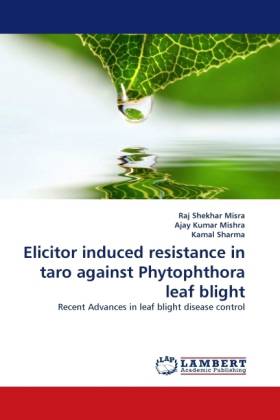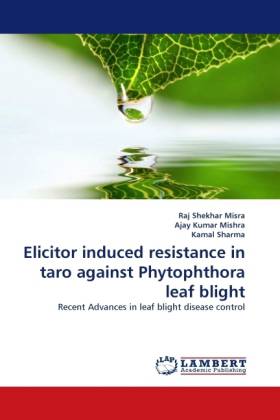
- Afhalen na 1 uur in een winkel met voorraad
- Gratis thuislevering in België vanaf € 30
- Ruim aanbod met 7 miljoen producten
- Afhalen na 1 uur in een winkel met voorraad
- Gratis thuislevering in België vanaf € 30
- Ruim aanbod met 7 miljoen producten
Zoeken
Elicitor induced resistance in taro against Phytophthora leaf blight
Recent Advances in leaf blight disease control
Raj Shekhar Misra, Ajay Kumar Mishra, Kamal Sharma
Paperback | Engels
€ 108,45
+ 216 punten
Omschrijving
Leaf blight of taro, caused by Phytophthora colocasiae Raciborski, is the most destructive disease of Colocasia esculenta.The disease has severely constrained taro production. Based on disease severity its highly solicited to develop disease prevention method. The use of disease-free planting material is important in halting the spread of P. colocasiae from nurseries to fields and also highly relevant to limiting the spread of it across the globe.In view of that we have developed Nested PCR-Primers for rapid and sensitive detection of Phytophthora colocasiae in infected planting material and infested soil. We have further aimed at investigating the role of BAP(synthetic cytokinin), pathogen derived elicitor protein in the interaction of P. colocasiae and its host plant taro, to explore its potential in controlling taro leaf blight disease.Our investigation shows that transgenic taro plants expressing eiher an elicitor protein or increased cytokinin level could be useful to engineer broad disease protection in taro plant against Phytophthora leaf blight.
Specificaties
Betrokkenen
- Auteur(s):
- Uitgeverij:
Inhoud
- Aantal bladzijden:
- 276
- Taal:
- Engels
Eigenschappen
- Productcode (EAN):
- 9783843366502
- Verschijningsdatum:
- 29/10/2010
- Uitvoering:
- Paperback
- Afmetingen:
- 152 mm x 229 mm
- Gewicht:
- 408 g

Alleen bij Standaard Boekhandel
+ 216 punten op je klantenkaart van Standaard Boekhandel
Beoordelingen
We publiceren alleen reviews die voldoen aan de voorwaarden voor reviews. Bekijk onze voorwaarden voor reviews.








